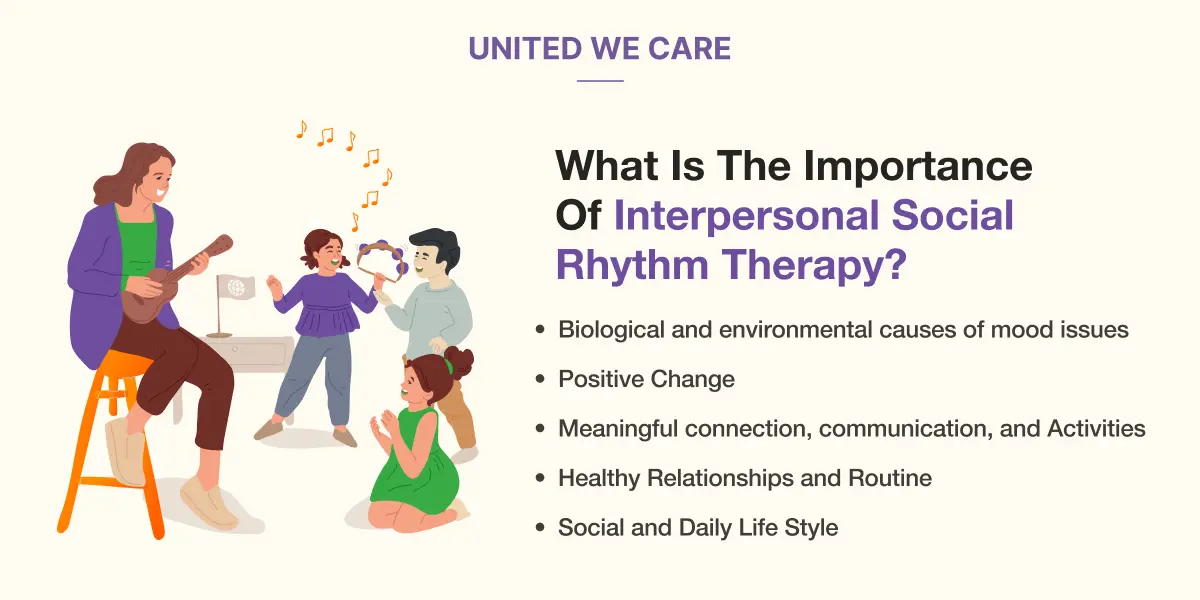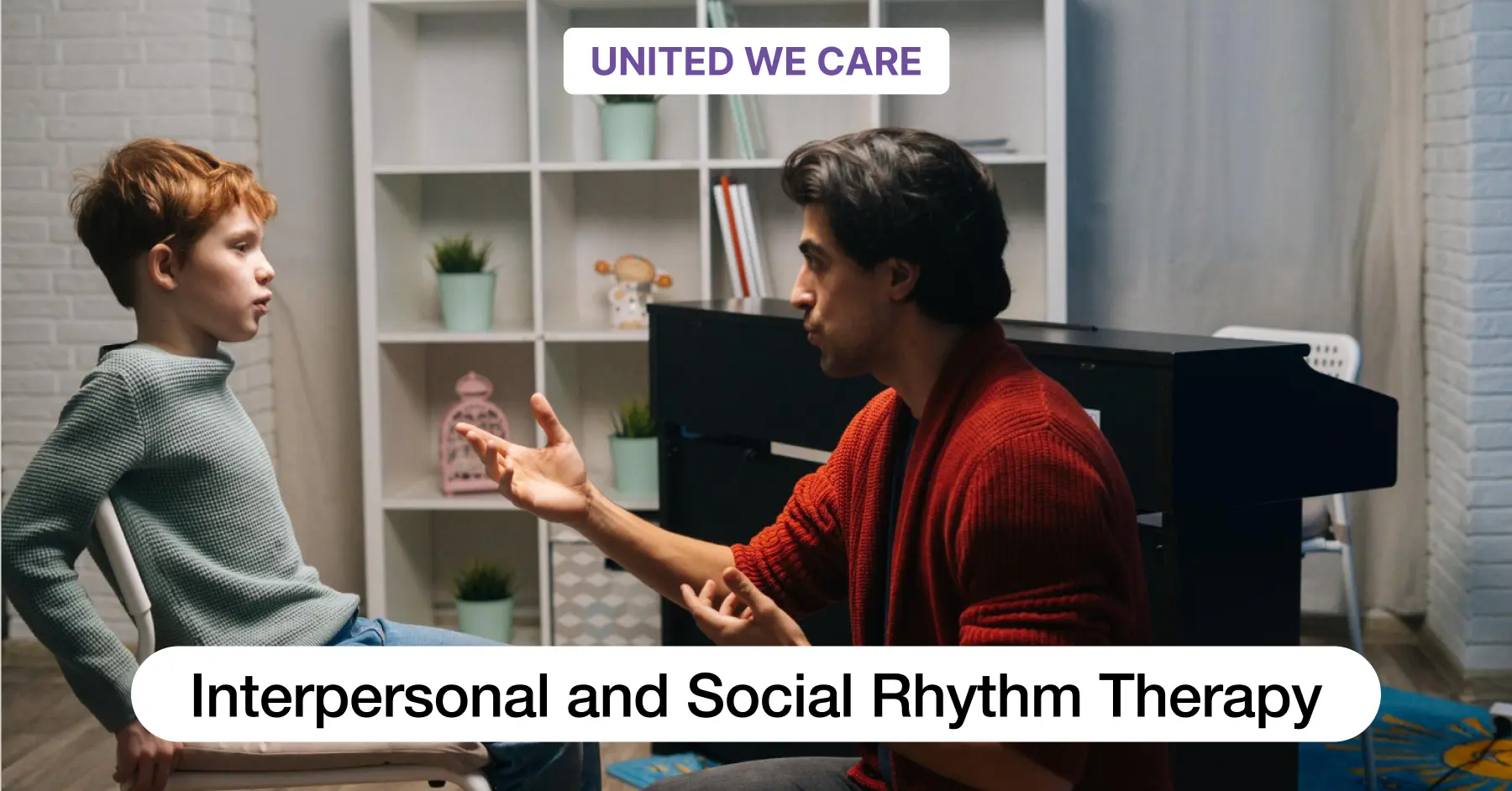Introduction
IPSRT takes a dual approach to treating mood disorders by incorporating interpersonal psychotherapy and social rhythm regulation. Developed by Dr. Ellen Frank, this multifaceted therapy empowers people to improve relationships, establish healthy daily routines, take control of moods, and restore stability and joy in life. It addresses both the psychological and biological drivers of mood problems.
What Is Interpersonal Social Rhythm Therapy?
Interpersonal social rhythm therapy, or IPSRT for short, is a type of talk therapy that aims to stabilize mood by looking at how someone’s social environment and biological clock interact.
The idea is that changes in routine can throw off the body’s natural rhythms related to sleep, eating, activity levels, and so on. This disruption can trigger mood episodes in folks vulnerable to conditions like depression or bipolar disorder. So, IPSRT helps identify and work through interpersonal issues that may be causing or worsening mood problems, such as grieving a loved one, switching up major life roles, or clashing with someone close.
The therapy also guides people to develop and stick to a regular daily schedule of meaningful, enjoyable, socially engaging activities. This can enhance mood stability and overall quality of life. The takeaway? IPSRT tackles mood issues from two key angles – biological and social. By keeping healthy routines and managing relationship challenges, mood balance improves. It’s personalized care for the whole person.
Who Created Interpersonal Social Rhythm Therapy?
Dr. Frank developed IPSRT based on her “social zeitgeber hypothesis” theory. In plain speak, this means our social cues and rhythms – like relationships, daily tasks, and life demands – can actually affect the biological cycles of folks prone to mood issues. She was like, whoa, these factors can throw off sleep/wake patterns and influence moods. It’s pretty mind-blowing stuff!
In 2005, Dr. Frank dropped knowledge in her book “Treating Bipolar Disorder: A Clinician’s Guide to IPSRT,” laying out her approach. Over the years, through multiple clinical trials with different groups, she’s backed up how well IPSRT can work by getting social rhythms back on track.
The takeaway? Dr. Ellen Frank is a true innovator in the field who pioneered an amazing therapy addressing the root biological and social causes of mood disorders. Major props to this boss lady!
Interpersonal And Social Rhythm Therapy Is Used To Treat
When you’re struggling with mood issues, it can feel like your whole world is off-kilter. Your sleep schedule is messy, your social life is wonky, and your emotions are all over the place. Everything just feels out of sync. That’s where Interpersonal and Social Rhythm Therapy, or IPSRT, can help regain some balance. The goal is to understand what triggers those mood disruptions while bringing back a sense of routine and healthy connections.
- In IPSRT sessions, you explore your patterns with sleep, meals, and activities – seeing where they’ve veered from consistency.
- You also discuss relationships that could use some TLC during rough patches.
- By working on both your inner and outer worlds, IPSRT builds resilience over time. The aim isn’t just feeling better temporarily but learning to cope better in the long term.
- You discover ways to structure your days that provide emotional support.
- While IPSRT is often used for bipolar disorder, its flexible approach works for other issues, too.
- It sees the whole person, not just a diagnosis. IPSRT teaches lifestyle and community management so you can handle life’s ups and downs with confidence.
- The hope is that you can rebuild a life filled with purpose, fulfillment, and steady rhythms.
- IPSRT equips you to handle moods while staying connected to what truly matters.
Importance Of Interpersonal Social Rhythm Therapy
Mood disorders can really take a toll on someone’s life. That’s why it’s so important to get the right kind of help. One type of therapy that doesn’t get enough attention is interpersonal social rhythm therapy or IPSRT for short.

- Biological and environmental causes of mood issues: This approach looks at both the biological and environmental causes of mood issues. It helps people take back control of their moods by understanding how their relationships and routines affect how they feel.
- Positive Change: The cool thing about IPSRT is that it empowers folks to make positive changes.
- Meaningful connection: It gets them thinking about building meaningful connections, taking on fulfilling roles, and adding activities that enrich their life.
- Healthy Relationship and Routine: When people have healthy relationships and routines, it can work wonders for their mental health. IPSRT builds resilience by promoting recovery in all areas of life.
- Social and Daily Life Style: Other treatments often just focus on brain chemistry without looking at the big picture. They miss how much our moods depend on what’s going on around us. IPSRT fills in those gaps. It lets people see how they can manage their moods by modifying their social and daily rhythms. That’s huge because it puts them back in the driver’s seat.
So, if you or someone you care about struggles with depression or bipolar disorder, bring up IPSRT. Getting in sync socially and sticking to healthy routines can make a world of difference. IPSRT offers real hope by addressing mood disorders in a holistic way.
Conclusion
Mental health is complicated. There are so many factors that can throw off someone’s mood and well-being. That’s why it’s amazing there’s a therapy like IPSRT that tackles mood disorders from different angles. IPSRT combines two proven approaches – interpersonal psychotherapy and social rhythm regulation. It’s based on research showing our social connections and daily routines actually influence our biological clocks and moods. Wild, right? The brilliant mind behind IPSRT is Dr. Ellen Frank. She’s a leading expert on mood disorders and figured out this multi-pronged approach could really help. IPSRT can be useful for all kinds of conditions – depression, bipolar, anxiety, schizophrenia – where mood instability and circadian rhythm disruption rear their ugly heads.
What’s powerful about IPSRT is it addresses both the psychological and biological pieces of the puzzle. It helps people pinpoint how their relationships and lifestyle habits impact their mood. Then, they can make changes to improve their mental health. The goal is to develop healthy social connections and a routine that enhances mood and well-being. When people can get in sync socially and stick to routines, it works wonders. IPSRT puts them back in control. So, if you or someone you care about struggles with mood issues, bring up IPSRT, and that too through United We Care. This holistic therapy empowers people by giving them tools to manage their moods themselves. There’s real hope!
References
- K. M. Douglas et al., “Randomised controlled trial of Interpersonal and Social Rhythm Therapy and group-based Cognitive Remediation versus Interpersonal and Social Rhythm Therapy alone for mood disorders: study protocol,” *BMC Psychiatry*, vol. 22, no. 1, p. 115, Feb. 2022. DOI: 10.1186/s12888-022-03747-z. [Online]. Available: https://doi.org/10.1186/s12888-022-03747-z
- L. Steardo Jr. et al., “Efficacy of the interpersonal and social rhythm therapy (IPSRT) in patients with bipolar disorder: results from a real-world, controlled trial,” Annals of General Psychiatry, vol. 19, no. 1, p. 15, Mar. 2020. DOI: 10.1186/s12991-020-00266-7. [Online]. Available: https://doi.org/10.1186/s12991-020-00266-7
- J. A. Swartz et al., “Implementing Interpersonal and Social Rhythm Therapy for Mood Disorders Across a Continuum of Care,” Psychiatric Services, vol. 66, no. 12, pp. 1372-1375, Dec. 2015. DOI: 10.1176/appi.ps.201400537. [Online]. Available: https://doi.org/10.1176/appi.ps.201400537
- N. K. N. and A. A. S., “Interpersonal and Social Rhythm Therapy,” FORIKES: Journal of Family Nursing, vol. 1, no. 1, pp. 1-8, Jun. 2019. DOI: 10.33860/forikes.v1i1.13. [Online]. Available: https://doi.org/10.33860/forikes.v1i1.13
- S. K. and S. K., “Effect of Interpersonal and Social Rhythm Therapy on Global Functioning of Patients with Bipolar Affective Disorder-Manic Episode,” Journal of Emerging Technologies and Innovative Research, vol. 7, no. 11, pp. 100-104, Nov. 2020. [Online].









